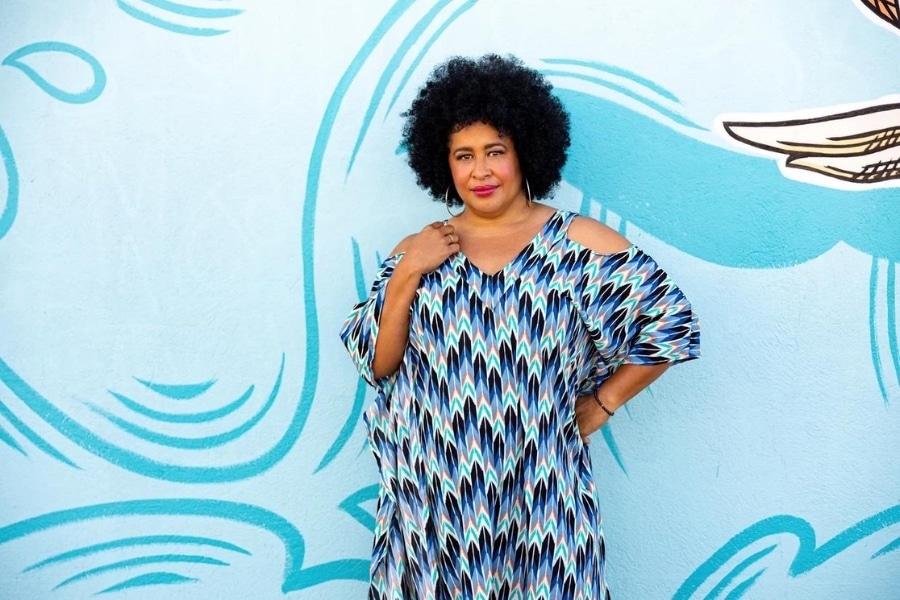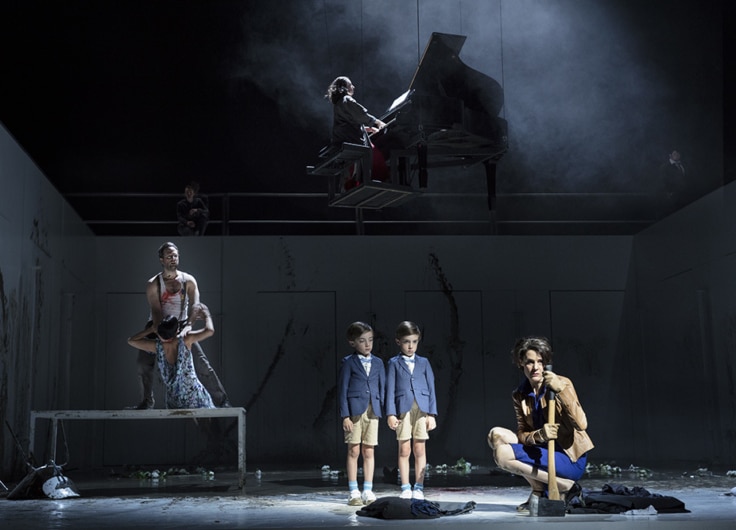Tania Kross Wins Johannes Vermeer Award for Making Opera Mainstream
Tania Kross received the prestigious Johannes Vermeer Award. The Netherlands’ most popular mezzo-soprano makes opera accessible to millions of people. Before that, she constantly deviated from the well-trodden paths.
The jury was unanimous: mezzo-soprano Tania Kross receives the Johannes Vermeer Award – the Dutch state prize for the arts – for ‘her leading international singing career and the innovative way in which she makes opera widely accessible, and also for how she appeals to, connects and inspires a diverse audience.’
 Tania Kross
Tania Kross© Wessel de Groot
Kross is perhaps the most popular singer in the Netherlands. An audience of millions got to know her as a candidate in the thirteenth season of the popular game show Wie is de Mol? (Who is the Mole?). Ten years later, it appears that she had been using her bag of tricks all along to open up an art form ‘that seemed inaccessible to a large and contemporary audience.’ Take our word for it: she’s hit the ground running.
She wants it all
Tania Kross’ career path can hardly be called traditional. She earned her first pocket money by winning karaoke competitions. As a young teenager, she was already singing on the cruise ships that docked in her home port of Willemstad in Curaçao. Her parents could not stand in the way of the driven teenager. ‘I needed a stage,’ she says in Ik wil alles (I Want it All), the documentary made about her. ‘If my parents wouldn’t come with me, I would go alone.’
At barely the age of seventeen, she crossed the ocean to go study at the Utrecht Conservatory. ‘You can’t sing, but you are a singer,’ they must have said after her admissions test. Years later, Kross remains modest: ‘I’m not the best singer. I’m the one who works the hardest. I am reliable. I am on time. I am prepared. Directors and conductors love working with me because they don’t have to worry. […] You can achieve so much more with this attitude.’
After her studies, Kross followed the well-trodden paths of classical music for quite a while. As a student, she won the first prize of the Young Music Talent Foundation, which often marks the start of a successful career. She became a ‘Rising Star’ at the Royal Concert Hall (Concertgebouw) in Amsterdam. When the critics subsequently ran out of superlatives for her portrayal of Carmen at the Staatsoper Stuttgart, the star became a supernova. Even the prestigious Glyndebourne Festival swooned over her rendition of Habanera.
But Kross’ favourite role did not bring her happiness. She says the production in Stuttgart broke her soul. ‘I looked like Marilyn Monroe, and the choir members were horror clowns. Don José kicked me to death four times, after which I was brought back to life by a frog with an Ikea lamp,” the singer said in an interview with Mischa Spel of the Dutch newspaper NRC. “Do I want to be part of this, I wondered. In capitals: NO.”
Did she swear off opera at that point? Not a chance. But she left the opera world and its heavy work rhythm. ‘Singing in an opera means going where there’s work,’ she told Dutch newspaper Algemeen Dagblad a few years ago. ‘And that often means six weeks of rehearsals in France followed by six weeks of performing. This means being away from home for three months. Singing is fun, but by singing and producing myself, I also get to be home with my family a lot, and that combination brings me joy.’
Removing the mask
Since then, Kross hasn’t actually sung in a traditional production. And yet, over the past fifteen years, she has introduced significantly more people to opera than her colleagues in the classical circuit. Her secret weapon: Tania is a ratings smash.
After Wie is de Mol?, she also participated in Beste Zangers (Best Singers). Together with musical actor Tommie Christiaan, she scored a number-one hit on the iTunes download list. In 2019, she won the first season of The Masked Singer. For weeks, the mezzo remained under the radar, not revealing the full potential of her operatic voice. But in the finale, in an interpretation of Sia’s Chandelier
– full of utter drama – ‘she finally exposed her real sound.’ More than two million viewers experienced – perhaps for the first time – how powerful such a voice can be.
It was precisely this fusion of genres that proved crucial in the rest of her journey. As far as she’s concerned, music ‘doesn’t have to be pigeonholed.’ In her own performances, different musical styles go hand in hand: from Mozart to Madonna, from Curaçao to the Royal Concert Hall. They are performances by ‘age-old prodigies and contemporary pop princesses’ where Henry Purcell goes hand in hand with Freddie Mercury, and where Spinvis plays ping-pong with Sergei Rachmaninoff.
For one of her few CDs, Krossover, she asked a dozen or so pop artists to ‘write a new kind of dramatic song that combined the best of pop and opera.’ Popular songwriters such as Huub van der Lubbe, Martijn Konijnenburg and Lucky Fonz III gave answers to that question.
In her own performances, different musical styles go hand in hand: from Mozart to Madonna, from Curaçao to the Royal Concert Hall
That approach caught on. While traditional houses struggled with gaining new audiences and expanding, Kross filled halls – even arenas such as Rotterdam Ahoy and the Ziggo Dome in Amsterdam – with an extremely diverse crowd. ‘In my musical theatre shows, old, young and diverse all come together,’ she told NRC. ‘The elite can turn their noses up at this, but I think it is a privilege to be able to introduce all those people to classical music.’
Music unites
‘All those people’ – for Tania Kross, this certainly also means the very youngest. Perhaps that is one of her most effective schemes. Very often, wonderful classical music remains unknown and thus unloved. Anyone who has heard an opera singer perform once is usually captivated immediately, but the threshold for that first time is often much too high.
She certainly plays that part in her television work. For example, as a jury member in channel NPO1’s
singing competition, Aria – although Kross says she is not a huge fan of talent shows: ‘That competitiveness does not fit well with music. Music unites.’
Kross wants a theatre for Curaçao
Kross has been working with Muziek Telt! for quite some time now, an initiative that brings schoolchildren in contact with all forms of music in an accessible way. She has also been a loyal ambassador of the Stichting Leerorkest Nederland (Netherlands Learning Orchestra Foundation) since its early years. This organisation helps schools start a student symphony orchestra and immediately acquires the instruments necessary. ‘And the reason I’m so excited about this is that I am a product of education myself. I didn’t have a mother who played the piano or a father who played the flute. And yet I managed to go from an island to where I am now.’
She returned to that island during the Covid years and now focuses her unwavering drive on Willemstad. The learning orchestra had already established a Curaçao division, but Kross’ work did not stop there. The title of her documentary, Ik wil alles, is still relevant. Using the local native language, Papiamentu, she worked on a new repertoire in 2013. Together with composer Randal Corsen, she wrote the opera Katibu di Shon, ‘A Gift Back to Our Island’. Her next gift had to be infrastructural: Kross wants a theatre for the country again. The local theatre, the Sentro Proarte, has been in ruins since a major fire in 2016.
Hopefully, the Johannes Vermeer Award (‘a sum of 100,000 euros intended for the realisation of a special project within its own field of activity’) can now make a serious contribution towards this.






